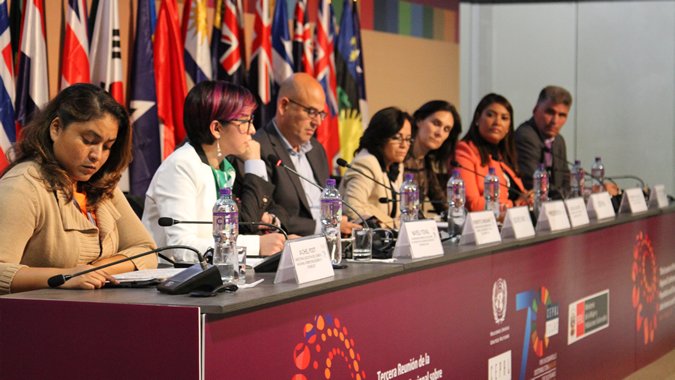Progress on Implementing Priority Measures of the Montevideo Consensus Praised, but Challenges Remain
Work area(s)
The demands of girls, boys, adolescents and youth, aging, sexual and reproductive health, and the persistence of gender gaps were among the issues addressed during the second day of the Regional Conference on Population and Development.

The pending challenges to address the demands of girls, boys, adolescents and young people in the region, aging, access to sexual and reproductive health, and persistent gender gaps were some of the issues discussed during the second day of the third session of the Regional Conference on Population and Development in Latin America and the Caribbean, which is being held through Thursday, August 9, in the Convention Center of Lima, Peru.
On the first panel of the session – organized by the Economic Commission for Latin America and the Caribbean (ECLAC) and the government of Peru, with support from the United Nations Population Fund (UNFPA) – participants spoke of the challenges related to the new demographic structure in Latin America and the Caribbean, a region that is aging and where it is expected that, by the year 2040, the percentage of people 60 years and older will surpass those under 15 years of age for the first time, according to ECLAC’s figures.
The panel, moderated by Cecilia Aldave, Deputy Minister of Vulnerable Populations of Peru, was comprised of Roberto Candiano, Undersecretary for the Rights of Children, Young Persons and the Family of Argentina; Robiamny Balcácer, Minister of Youth Affairs of the Dominican Republic; Nayeli Yoval, General Coordinator of Elige-Red de Jóvenes por los Derechos Sexuales y Reproductivos; Alberto Fernández, Director of the National Care Program for Older Adults of Cuba; and Ix-Chel Poot, Executive Director of the National Council on Ageing of Belize.
“The country reports demonstrate clear efforts to improve the conditions of girls, boys, adolescents and young people, as well as in the case of older adults,” Deputy Minister Aldave said.
However, she added, challenges remain regarding young people’s access to higher education and the prevention of adolescent pregnancy, along with reconsidering the protection services that are being provided to older adults.
Nayeli Yoval, General Coordinator of Elige-Red de Jóvenes por los Derechos Sexuales y Reproductivos, sustained that “the importance of the Montevideo Consensus lies not only in the fact that it is the most progressive intergovernmental agreement, but also because it reaffirms that development is not possible without the full guarantee of human rights for all people.”
She noted that in 2015, the group composed of girls, boys, adolescents and young people reached its maximum level of demographic representation with a peak of 325 million people who represent 51.5% of the regional population. She also warned that, while progress has been made, there is still pending work to be done on the prevention of teenage pregnancy and access to higher education and decent work, among other issues.
On the second panel, participants analyzed the challenges to guaranteeing access to sexual and reproductive health services, and to closing gender gaps in Latin America and the Caribbean.
The panel was moderated by María del Carmen Calle, Vice Minister of Public Health of Peru, and comprised of Verónica Espinosa, Minister of Public Health of Ecuador; María Antonieta Alcalde, Advocacy Director of the International Planned Parenthood Federation/Western Hemisphere Region (IPPF/WHR); Marcela Eternod, Executive Secretary and Acting President of the National Women’s Institute (INMUJERES) of Mexico; and Lucy Garrido, of Articulación Feminista MARCOSUR.
The panelists warned about the persistence of adolescent pregnancy in Latin America and the Caribbean, a region that has the world’s second-highest rate behind Sub-Saharan Africa, estimated at 66.5 births for every 1,000 girls between 15 and 19 years of age.
They also flagged the high levels of violence against women and the lack of data that would allow for measuring its real impact in the region, along with pending challenges on gender equality.
In that sense, they indicated that the Sustainable Development Goals are the opportunity to confront multiple inequalities since the full insertion of women in all spheres is indispensable to achieving the targets.
“2030 is very close, today we need political guarantees to eliminate gender gaps through affirmative actions and their inclusion in budgets,” said Marcela Eternod, from INMUJERES of Mexico.
During the second day of the Conference, Peru held two special sessions focused on gender violence and on the challenges of climate change and the role of the indigenous populations of Amazonia.
The third session of the Regional Conference on Population and Development in Latin America and the Caribbean will conclude on Thursday, August 9, with panels on the priority measures of the Montevideo Consensus and two high-level roundtables that will address progress and challenges regarding implementation of the Montevideo Consensus in the Caribbean, and institutions for the full integration of population dynamics into sustainable development with equality and respect for human rights.
ECLAC, meanwhile, will present the proposal for a virtual platform to contribute to regional follow-up of the Consensus.
The closing ceremony will be led by César Villanueva, President of the Council of Ministers of Peru; Mario Cimoli, ECLAC’s Deputy Executive Secretary; and Dereje Wordofa, Deputy Executive Director of UNFPA.
Related event
Type
Country(ies)
- Latin America and the Caribbean


